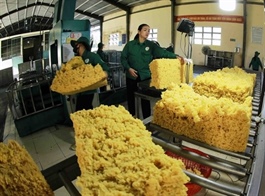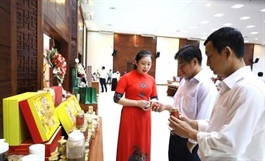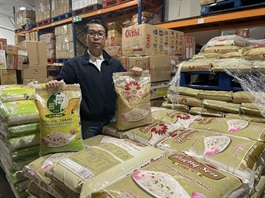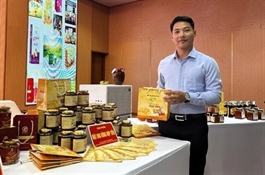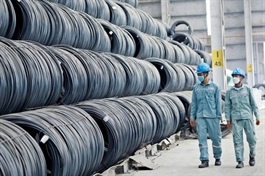Hòa Bình honey awaits reactions from UK
Hòa Bình honey awaits reactions from UK
Twenty boxes, containing 250 jars of pure honey, left Hòa Bình Province for the United Kingdom on October 12.

Members of Green Life Cooperative conducts a periodic check-up on bees. Honey produced by the cooperative was exported to the United Kingdom recently. — VNA/VNS Photo Vũ Hà |
It was the first time that the province exported locally produced honey, which came from bees raised by the Green Life Co-operative in Thượng Tiến Commune, Kim Bôi District – a relatively modest business with 11 members.
After this first shipment, farmers, producers, and agricultural authorities in Hòa Bình are now waiting for feedback from the market so they can adjust production scale and volume.
"Although the quantity of the exported honey is not large, this is a significant step forward that allows Hòa Bình’s OCOP (One Commune One Product) honey to enter one of the most demanding markets in the world," said Green Life Co-operative director Đinh Công Thuần.
To ensure that the honey's quality meets the requirements of international markets such as the UK, the cooperative has had a clear production strategy in place since 2017.
Standards were set for different stages of the production process including technical care, harvesting methods, and packaging. The process follows VietGAP standards for beekeeping and ISO22000 standards for processing.
"After harvesting, the water content of the honey was reduced to about 17.2 per cent to make sure it has the right viscosity and meets the quality requirements from UK importers," said Thuần.
R.Y.B Joint Stock Company delivered the honey to the UK. To prepare for the shipment, the company’s director, Nguyễn Thị Thanh Hương, said market research began in 2022.
"We researched many regions that produce honey, but the pristine forest areas in Thượng Tiến help create the exceptional taste and purity of the honey here, so we chose it as the supplier," she said.
“While the UK is a demanding market, by ensuring technical standards, proper documentation and certifications, and with the unique natural flavor of the honey, we will likely get its approval.”
From a local perspective, Đinh Tất Thắng, head of Kim Bôi District’s Department of Agriculture and Rural Development, said that as Thường Tiến honey was considered to have great potential, technical support, equipment, and training were provided to Green Life Cooperative’s members in the production process.
"Thường Tiến honey has sold very well in the domestic market, and now it can also be exported to the UK,” he said.
“We will advise the district to expand this production model so that if the UK market accepts it, we will have the capacity to supply."
Follow the market
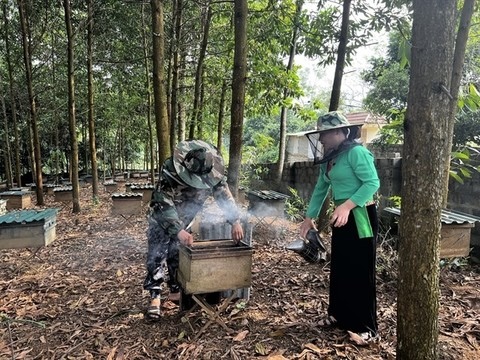
Honey and related products (beeswax, honey liqueur) produced by Kim Bôi District are on display at a national trade fair. — VNA/VNS Photo Vũ Hà |
Nguyễn Hồng Yến, head of Hòa Bình Province’s Plant Protection and Cultivation Division, has been instrumental in connecting many of the province’s agricultural products with international markets.
She emphasised that different markets have different requirements.
"The standards of international markets might not necessarily be higher, but different from domestic ones,” he said. “So it is very important to closely follow the target market's requirements so we can guide cooperatives and farmers to produce in accordance with their specifications.”
For example, the UK requires a certificate of bee health, which is not needed in the domestic market. “To obtain this certificate, we had to provide a traceable health history, records, and tests of the bees,” Yến said.
It’s a long journey ahead for Hòa Bình if it wants to have more agricultural products exported, according to Yến.
Once the UK market shows approval for Thường Tiến honey, it will be a good starting point to expand production. However, the province should take it one step at a time, even slow and small at first, to build a solid foundation for agricultural exports.
"Our agricultural products will be given specific local brands, depending on the production area and the product itself,” Yến said. “Our viewpoint is that special products should be produced in limited quantities and supplied in a short time, but they should have strong branding and help build traditional markets.”
To improve the quality of agricultural exports from Hòa Bình in the future, Yến stressed the importance of increasing the production capacity of co-operatives, and enhancing post-harvest work such as preservation, processing and storage.
"Co-operative members and leaders should receive regular training and consultations with experts to improve their production and management capabilities, as well as their organisational operations," he said.
He also suggested the Government invest more in machinery and production lines for co-operatives, which will increase the value of agricultural products and reduce the seasonal pressures faced by farmers, especially with perishable goods.
"This approach would not only boost efficiency in agricultural exports but also ensure the sustainability of local agricultural production in our province," he said.







